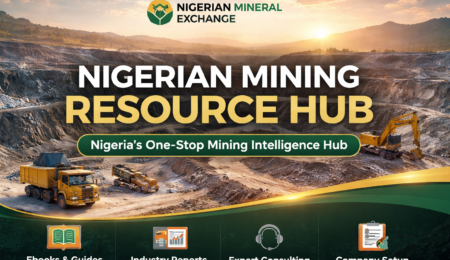Nigeria’s mining industry is no longer the “sleeping giant” of the economy. With growing demand for critical minerals like gold, lithium, rare earths, and industrial metals, the sector is attracting attention from both regional and global investors. But for many, the question remains: what’s the safest and most profitable way to enter this market?
The answer lies in well-structured partnership models. From joint ventures to technical service agreements, the right partnership approach can make the difference between a thriving investment and a failed attempt. This article explores tested models for foreign direct investment (FDI) in Nigeria’s mining sector and how investors can position themselves for long-term success.
Why Nigeria Is an FDI Destination for Mining
- Untapped Reserves: Nigeria hosts over 44 different mineral resources, many still underexplored.
- Policy Shifts: Government initiatives now encourage private-sector participation and foreign partnerships.
- Regional Demand: With Africa’s industrialization drive, Nigeria is positioned as a supplier of raw and processed minerals.
- Strategic Minerals: Lithium, gold, lead, and rare earths are fueling new waves of global demand.
FDI in mining is not just about pouring money into projects; it’s about choosing the right partnership model that balances local realities with investor expectations.
Partnership Models That Work in Nigerian Mining
1. Joint Ventures (JVs)
- How It Works: A foreign investor partners with a Nigerian license holder or operator, sharing equity, risks, and profits.
- Why It Works: Offers direct access to local mining licenses and ensures regulatory compliance.
- Best For: Investors seeking long-term operations with significant control.
2. Technical Service Agreements (TSAs)
- How It Works: Investors provide expertise, equipment, or technology while local companies manage licenses and operations.
- Why It Works: Minimizes upfront risk while establishing a foothold in the market.
- Best For: Investors entering cautiously or testing the Nigerian market before scaling up.
3. Offtake Agreements
- How It Works: Foreign buyers commit to purchasing minerals at agreed terms, often financing part of the operation in return for supply security.
- Why It Works: Provides guaranteed market access for Nigerian miners while ensuring investors secure raw material flows.
- Best For: Investors focused on supply-chain security rather than operational control.
4. Equity Participation in Local Companies
- How It Works: Investors take minority or majority stakes in Nigerian mining companies.
- Why It Works: Offers direct ownership without the complexities of new license applications.
- Best For: Those seeking exposure to Nigeria’s mining sector without running day-to-day operations.
5. Public-Private Partnerships (PPPs)
- How It Works: Investors collaborate with Nigerian government entities to develop infrastructure or resource-based projects.
- Why It Works: Government backing reduces political risk and strengthens community acceptance.
- Best For: Large-scale, capital-intensive projects like rail, smelting, or mineral processing.
Key Success Factors for FDI Partnerships
- Regulatory Compliance: Ensure licenses and operations meet Nigeria’s Mining Act requirements.
- Due Diligence: Verify project reserves, licenses, and community relationships before committing.
- Local Engagement: Strong community and stakeholder buy-in is non-negotiable for smooth operations.
- Clear Exit Strategy: Contracts should define buyout terms, transferability, and dispute resolution.
Common Pitfalls to Avoid
- Partnering with “paper companies” that hold licenses but lack operational capacity.
- Over-reliance on verbal agreements without enforceable contracts.
- Neglecting CSR and environmental compliance can lead to shutdowns.
- Ignoring currency, repatriation, and taxation frameworks.
How We Support Investors
At the Nigerian Mineral Exchange (NME), we specialize in bridging the gap between foreign investors and credible Nigerian mining operators.
- Our flagship service, the Nigerian Mining Investment Navigator, helps investors identify the best partnership model for their objectives, backed by deep due diligence.
- Through the Mining & Mineral Trading Company Setup (Nigeria) package, we help investors establish fully compliant entities to engage in mining, mineral trading, joint ventures, offtake agreements, or equity stakes.
- For those exploring sector-wide opportunities, our ebook Unlocking Nigeria’s Mineral Wealth: 113 Lucrative Business Ideas provides inspiration and clarity on profitable entry points.
These tools and services are designed to ensure your FDI in Nigerian mining is both secure and profitable.
📘 The Nigeria Mineral Trading & Licensing Blueprint (2026 Edition)
If you are serious about buying, selling, or trading minerals legally in Nigeria, you cannot afford to rely on guesswork, outdated advice, or hearsay. The regulatory environment is tightening fast, and costly mistakes now lead to permit denials, seizures, or permanent blacklisting.
That’s why we created The Nigeria Mineral Trading & Licensing Blueprint: 2026 Guide to Buying Center Licenses & Purchase Permits — an updated, clear, step-by-step, insider guide that shows you exactly how to obtain Mineral Buying Center Certificates, Purchase & Possession Permits, and related approvals without delays or regulatory traps.
This guide distills real regulatory procedures for 2026, compliance requirements, and practical insights used by serious operators — saving you months of confusion, wasted money, and avoidable risk.
If mineral trading is part of your business future, this blueprint is not optional — it’s protection.
Conclusion
Nigeria’s mining sector is brimming with potential, but the real key to success lies in choosing the right partnership model. From joint ventures and technical service agreements to equity participation and PPPs, there are multiple pathways for foreign investors. With proper due diligence and the right local partner, investors can unlock long-term opportunities and contribute to the sustainable growth of Nigeria’s solid minerals sector.
The window of opportunity is now. Secure your consultation today and take the first step toward a profitable mining partnership in Nigeria.
READ ALSO:
How to Acquire a Mining Site in Nigeria Without Losing Your Investment
How to Register a Mining Company in Nigeria (Step-by-Step Guide – 2026)
The Ultimate Guide to Nigerian Mining Information & Resources (2026)
How to Start a Mining Company in Nigeria (2026 Step-by-Step Guide)
Why Most Gold Mining Startups Fail in Nigeria (And How to Avoid Them)
Requirements for License to Purchase and Possess Minerals in Nigeria (2026)
Nigerian Gold: State-by-State Guide
10 Smart Ways to Find Gold on Your Land in Nigeria
Need a Mining License or Mineral Trade Permit in Nigeria? Here’s How We Can Help





Leave a Reply